Chapter 8
About Tour Guides
How to get 50 times more out of your trip
The very first trip we took abroad was to England in 1980, seven years before my wife had her series of strokes, so we were not burdened with a wheelchair, disabilities, or anything
at all.
We had a Tour Book of England, probably Fodor's, and were walking around the central section by the Houses of Parliament, Big Ben and Buckingham Palace. We turned a corner, and there in front of
us was Westminster Abbey. It is a most impressive structure, so steeped in history you could spend a week just exploring it alone and forget everything else in London.
We entered the chambers and were
immediately over-awed by the splendor and majesty of the place. With mouths open in amazement and necks craned back so we could see the ceiling and stained glass, we walked along. Suddenly, I felt a buzzing, like a slight jolt of electricity run through me. I stopped and looked down. I was standing on the burial marker of Sir Isaac Newton. In fact, as we looked at the floor, there were markers for the burial sites
of many of the world's most renown people. We had simply walked right past, not even knowing where to look, missing so much in our eagerness to see so much.
This situation has presented itself again and
again. Now, when we travel, we always make it a point to hire a guide to accompany us when we are touring important areas.
I am an avid photographer, and I take tons of pictures when we travel. Once home I take them and place them in photo albums. I write captions for
each one, that is, write a description of what each picture represents, what we thought at the time, what significant event or theme the photo may reveal about the culture of the place where it was taken.
In other words, I create a "story book" of the country we've just seen. By doing this, anyone coming to the office can pick up one of the albums and leisurely become acquainted with the country.
I cannot tell you how much pleasure it gives me when patients come early for their appointment just so they can look through the albums. But there is one comment that especially relates to this issue about
tour guides. Many of my patients will say to me, "Doc, I was there- where you were, but I didn't see this or I didn't see that." Like my wife and me in England, these people have traveled
but missed a great deal because they did not know what to look for.
Another example:
We arrived in Delhi from Cochin, India and were met at the airport by a guide we had pre-hired for this portion of our trip. We arrived at the airport on time, 7:15PM, but they had damaged
our wheelchair somewhere between the two cities. It took nearly 2 hours to get things fixed up before we could leave the airport, and during that time, I was getting myself worked up about the inconvenience,
about the time we were wasting, about the stupidity of the baggage handlers for damaging the chair in the first place. Our guide, a devout Hindu, placed his hand gently on my shoulder and said, "There
is a reason this has happened to you. Whatever that reason is, good will come of it." Yeah, sure. I smiled politely at him, but dismissed him in my mind. We finally left the airport, got into the
waiting car, and drove in relative silence to the hotel, 20 minutes away. As we approached the hotel, the streets near its entrance were chocked with people waving banners. Flashing lights, pandemonium! "You
see," he said to us, "It is as I told you- some good will come of this. What you see happening around you is a traditional Indian street wedding. There are few of these to be seen these days
because they are so expensive, and you are most fortunate to be here at this place at this time". "If your chair had not received damage, you would have arrived much earlier and missed this rare
spectacle". |
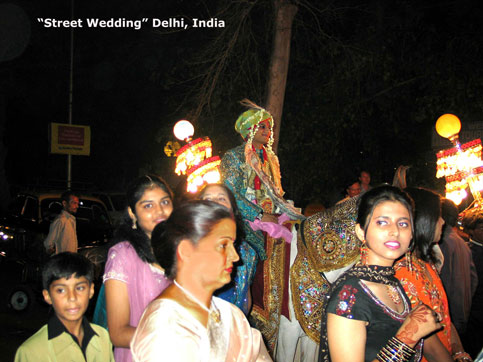
|
The beautiful bride-to-be on horseback
|
He then launched into a fabulous discussion of Indian weddings and social customs, religion, and castle structure, providing us an understanding of Indian culture we would never had
known- had it not been for this wonderful guide. The next morning, he accompanied us to Agra and "handed us over" to another guide, one of his friends and colleagues, who is a specialist in the
Taj Mahal. This new fellow wrote a large portion of the description of the Taj for one of the world's foremost tour books. He was also the personal guide for former President Bill Clinton when he, Hillary
and Chelsea visited the Taj a few years ago. Not to be name dropping, but this is the part of the story I have been getting to- stressing the value of working with local guides.
I want you to gaze once more on the picture of the Taj Mahal. The photo is a classic shot of this marbled masterpiece, taken from the spot where the guide told me to stand and shoot. |

Note the exquisite symmetry of the Taj Mahal. As is typical, you see the reflection of the building in the pool of water directly in front of it. This "mirror image" picture
is one of the most classic of all travel photographs, instantly recognized by most people the world over. I took it the morning of our second day in Agra. Well, when we first saw the Taj Mahal the day
before, the pools were empty- the water drained so they could clean the pools. What I did not know was our guide, a man of obvious clout had asked the groundskeepers to turn the water on the next morning
for us so we might get this photo.
Yes, you say, but private tours and private guides are expensive. And I say back, "I've waited 60 years to be here to take this shot". Was it worth the cost to me? Certainly!
I'll buy fewer gifts or eat in cheaper restaurants. Save money elsewhere.
Here is another story to help compel you to consider hiring a private guide. On our first trip to Italy, we flew into Rome for a few days before continuing north on the train. Our last
day in Rome was the last Sunday of the month, and with most shops closed, we decided, rather spur of the moment, to go to the Vatican. We hailed a taxi and told the driver we wanted to see the Sistine
Chapel. Bad news, he told us, because the last Sunday of each month is a free day at the Vatican. Anyone can come in and sightsee without having to purchase tickets. As we drove toward the chapel, there
was a line that snaked along the wall of the Vatican that seemed miles long. There had to be at least four thousand people waiting to get in. The place was mobbed. The cab driver pulled up to the entrance
and we were relieved to see a separate entryway for handicapped visitors. We got out, and with the looks that could kill from those thousands already waiting on line, we went directly inside.
Located immediately within the door was a waiting room for official Vatican guides. They sit there until hired by tourists. This particular morning, there was but a single person there,
an elderly gentleman, perhaps in his mid or late seventies, reading the Sunday newspaper. I asked if he was available for hire, and he replied he was. He asked how much time we wanted to engage him for,
and I told him 2 hours, 2 1/2 at most, as we had a train going north to catch in 3 hours time. We settled on a price, and off we went. He was walking briskly, though with a cane. It was wall to wall people,
all of whom totally ignored us in the wheelchair; stepping over us, tripping over us, crashing into us. "Prego, PREGO," he kept shouting, and he beat anyone with his cane who was in our way.
With such an incentive, the way cleared in front of us for most of the path we were following.
He knew the place like the back of his hand, and took us through doors that said "No Entrance", took us down deserted hallways that were clearly known only to "insiders",
up and down elevators we would never have located had he not been with us. Within a few minutes, we emerged from the secret corridors and entered the Sistine Chapel, resplendent with much of its famous
ceiling glowing after the recent cleaning and restoration work. "look at this", he would say, and he would then explain the history of the painting or statue in front of us. "Did you know
that when Leonardo did this, he would always..."
"And the Pope was enraged and commanded..." We learned as we went with him he was a retired professor who taught Art History at the university for 40 years before he retired. He was also the
senior official guide and probably knew more about the fabulous art objects than anyone else in the Vatican except its curator.
He taught us how to analyze the Various styles of the Masters. How earlier artists painted faces with little or no expression on them. How Leonardo revolutionized art by being the first
to paint his subjects with expression conveying emotions which would be running through their minds if they were to suddenly come to life and step out of the painting. We spent at least a half hour just
listening and learning about the Last Supper. How you could read their faces with the details Leonard had painted. The questioning look. The suspicious glance.
Our time with him was rapidly running out, but we couldn't tear ourselves away. "Can you stay with us longer", I asked. He replied nothing would please him more, but he worried
we would miss our train.
"We can always catch another train. They come nearly every hour", I told him. "But when shall we ever meet another such as you"? He was glowing with pride and appreciation. We continued
on, but in a gently guided way, giving him time to explain the development of art from Byzantine through post- Renaissance Italy. And then, he took us to see the Pieta. "Look! Do you see how
the marble garments appear to be cloth? If you look closely, you would swear you see the Madonna breathing. Can you feel what she is feeling as she gazes down upon the face of her slain Child"?
He taught us more in the four and a half hours we were together than we could have learned if we had graduated from the Corcoran Art Galleries in Washington, D.C. |
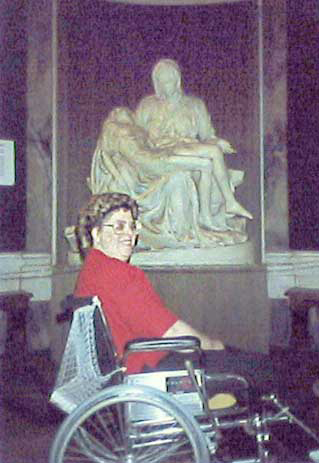
| Nancy and Michelangelo's Pieta in the Vatican, Rome, Italy
|
My photo is woefully unable to convey all that our guide showed us about the Pieta. He was correct: If you looked closely you would swear you saw the marble as the
Madonna breathed.
Yes, four and a half hours meant we missed our train. But we were spellbound the entire time he was in our employ. As we were getting ready to depart, I asked how much we owed for the
extra time. "No money could repay me for having such students as you two," he replies. "It was my pleasure if I served you well." I am not sure which of us honored the other more. We
guess it depends upon your perspective.
Over the next few years we sent Christmas cards to him each year until one year, we received a letter back from his daughter telling us he had passed away. Though his physical self may
be gone, to this day, whenever we enter a museum or gallery, we always think of him and are reminded of how differently we see art through eyes he forever opened for us. He gave us priceless memories and
unending future pleasures. How do you put a price on that? What would you be willing to give up to purchase such wisdom and knowledge? We guess that, too, depends upon your perspective.
Early in the 1990's, Nancy and I went to Japan on a trip planned by a Canadian travel agent who handled arrangements for American and Canadian members of the American Dental Association.
It is always a large meeting, and thousands of dentists from North America were going. He was impressed that we wanted to go on what would be an arduous trip, and he spent a good deal of time personally
arranging things for us. I told him I thought we should have a guide for the more important places we were to visit, especially Kyoto, the ancient capital of Japan. He phoned me back to say that a guide,
car and driver would cost us $1,700 per day! You must remember, this was a period when the Japanese economy was the fastest rising economy on the planet, and prices for everything were sky high. But $1,700?
Not a chance. We booked the tour with the agent, minus the guides. I figured to take our chances and make arrangements when we got to Japan.
It was around mid-afternoon when we arrived at the super futuristic train station in Kyoto. By the time we grabbed a cab, got to the hotel and checked in, it was near dinner time, and
we had no plans to do anything other than eat, wash up, unpack and go to bed. We stopped first, however at the concierge desk and waited until the crowd of people around her dispersed. By waiting, we would
have her complete attention. We explained our situation to her and after filling in some details we will discuss later in the chapter, her is what transpired:
We told her we would like to find someone who could accompany us around Kyoto. Someone knowledgeable, but outside the "system" because the cost for a professional guide was
way beyond our means. We gave her our itinerary and departure date and asked what she could arrange. She said it was close to the time she was through for the day, but if we could be patient and give her
a little time, she would see what she could do. We agreed to meet again the next morning about 10:30 or 11 o'clock.
When I got up the next morning, I decided to let Nancy sleep late. Had my breakfast then met with the concierge at 10:30 as she had suggested. "I have found just the right person
for you", she exclaimed,
"someone I know personally. He has his own car, speaks fluent English, and is a masters program student in architecture at the university here in Kyoto. I suggest you settle on the price with him,
but it will cost around $200." Still quite steep sum, but nowhere near the shocking amount of $1,700 we had been quoted earlier. I asked her to have him contact me- which he did. We settled on a price
of $165, including gas, and he took us everywhere. |
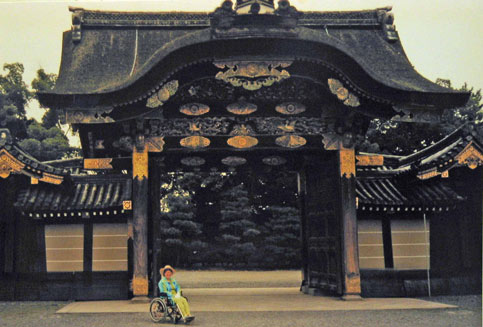
|
The glorious Imperial Palace in Kyoto, Japan
|
Nancy is dwarfed by the impressive Main Gate, Imperial Palace, Kyoto, Japan. Our guide pointed out the obvious psychological impact upon anyone entering this palace.
This entryway reeks of power, wealth and prestige.
We had a fabulous time with him, grateful both to him and the concierge who put us together.
When we left Kyoto for Tokyo, I gave her a substantial rip. I know many people feel the concierge is paid a salary by the hotel to provide service to guests, but this is service above
and beyond. Besides, she had saved us many time the tip I gave her, and all of us, she, the guide, Nancy and I were delighted.
Here is another most valuable secret for you We use this without fail whenever we contact a new travel agent or tour guide. We have written a lengthy description about the way Nancy
and I travel. In it, we describe the places we've been, the things we especially enjoyed seeing and doing. We include a discussion of our physical requirements- we need a step stool to get into a step
van, for example. We'll mention we prefer to start a day's tour around 10 AM, and that we usually run out of energy around 4 to 5PM. Of course, we make sure to tell all agents we need handicapped quarters
in hotels, and give them the dimensions of our wheelchair. We'll also mention things like we don't ordinarily eat lunch. That we don't want to stop at those ticky-tacky tourist trap shops where the guide
gets a kickback for bringing you there. Giving them this information first saves a lot of time and confusion, and helps ensure success with the people who will be working to put your trips together.
For the guides, irrespective of what we have already told the agent, we have a different approach. Many of the guides are hired by local contact travel agencies far removed from your
city or travel agent in the States. They will be utterly amazed when you show up expecting certain things to be in place. No one told the guide you needed a step stool, for instance. We usually tell our
guides, "Pretend we are your beloved aunt and uncle whom you may have met- but haven't seen since you were a small child. Now, we are coming to visit your Mom and Dad and will be in your city for
only a few days. Take us where you would take your real aunt and uncle; where you would take a friend with whom you roomed in college or university." I explain Nancy has limited physical endurance.
Some days she has lots of energy, and we can really go at it. Other days she is tired to begin with and won't last but a few hours. Even though we know we have to pay for the entire day, if she poops out,
we have to return to the hotel. Consequently, and this is most important, we ask the guide to draw up a list of the places he/she wants to take us. Then we ask them to rank these places, most important
first. In that way, should Nancy really tire quickly, we will at least have seen the best their city has to offer. We also tell them we don't especially like museums, are not interested to see the
place where the first adulterer was stoned to death. We specifically mention we don't eat lunch unless we request to a stop to do so, that we aren't particularly interested in names and dates. We tell
them we live to sit at sidewalk cafes and watch people as we discuss local customs and culture with our guides. This lets them zero in for us. Customize your own list. You'll reap ample rewards. It will
insure you a far better experience than if you leave it to chance. Be as specific as you can and you will guarantee yourself a great time.
Finally, one more priceless jewel for you to know about planning your trips. The experience we had in Kyoto was a most valuable lesson, but we were more than a little concerned about
arriving somewhere without having made definite arrangements. We gave this a lot of thought, and came up with a solution. We tried this on a trip to Spain.
We had reservations at the Weston Palace in Madrid, one of the city's better hotels. A few months before we were to actually go on the trip, I called the hotel, transatlantic, allowing
for the time difference so that I would be calling around mid-morning their time. I asked whoever answered the phone to let me speak with the concierge, and the call was transferred immediately. I
told the concierge my wife and I would be guests in their hotel on such and such dates, and that we were interested in his recommendation of who to contact to serve as guide/driver while we were in Madrid. "Ah",
he said,
"I know just the person- his name is Benito, and I will give you his cell phone number." I called Benito and introduced myself, telling him what we wanted to do, and asking if we could arrange
to hire him. In his case, he was employed by a travel agency based in Barcelona on an exclusive basis, and indicated he was willing to reserve the time for us, but we would have to book through his agency.
We did this, and so everything was in place by the time we arrived in Madrid. By contacting the concierge in advance, we assured ourselves of getting the best person for the job. The concierges know who
is really good and who is not.
Secondly, by booking directly with the agency in Spain, we saved the commission my agent in the States would have received. Not that we begrudge the agents their living, it just serves
our purposes better to do it this way. Turns out that Benito could have taught Spanish history and architecture to PhD's at any university in the world. We went all over Spain with him and found him extraordinarily
well educated and informed. We learned more about European history from him than I did in college, where history was my elective minor. |
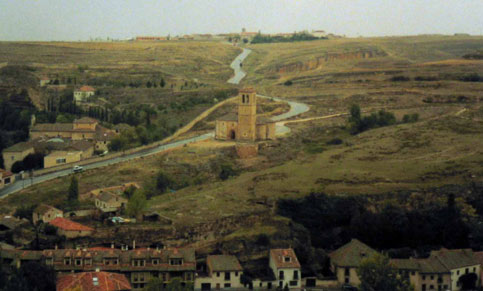
|
Distant view of a Knights of Templar Church off the parapet of Segovia Castle, Segovia, Spain
|
We ended up with a much fuller, richer comprehension of the importance of the Church in European history. He taught us much about the Knights Temlar, years before The Da Vinci Code was
published.
|
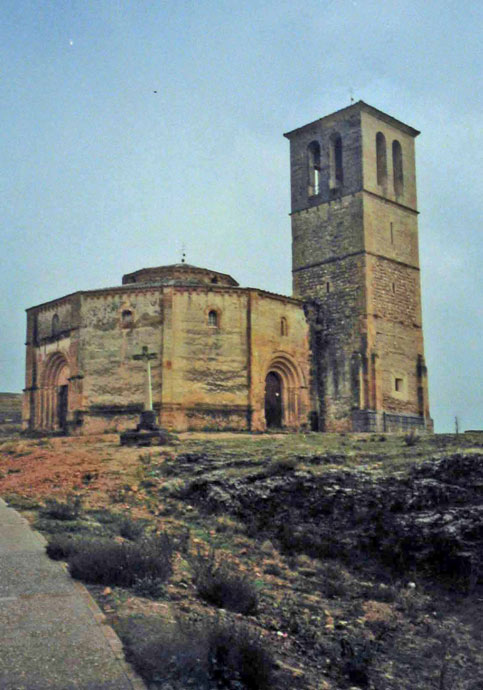
|
Closer view of the rare, Octagonal Templar Church, Segovia, Spain
|
Was he worth what we paid him? Without a doubt, he was the finest guide we have ever been with, and we would travel anywhere with him again. During long drives between cities, we go
into deep, deep discussions about religion, politics, local customs and heritages, on and on. Not the idle prattle of tour bus guides, Not the incessant dumb questions by someone in the back of the bus
who monopolizes the guide and only wants to know about everything you couldn't care less about. We have used this approach so often we don't hesitate using it again and again. It takes more "guts" than
we have to go into a strange place, knowing no one and having no firm arrangements. That's why this strategy we've just told you about is so valuable.
O.K. but suppose the place where you are staying isn't fancy and doesn't have a concierge? Here's another gem to solve that:
Remember the story about making a transatlantic call to the Weston Palace? Well, re-design that just a little. Say you are going to Rome, but plan to stay at a pensione. No matter. Go
online and search for the world's greatest hotels. There is a web site, and when you get it up, type in Rome, Note the telephone number for the most expensive, highest rated hotel on the list. Call and
do exactly what I did with the concierge in Madrid. Tell them you will be a guest in their hotel on such and such dates and want to pre-arrange for a guide. Who do they recommend? They aren't going to
check to see if you have a reservation or not. They will be glad to help. Please pay attention to this next request: If the concierge does help you, make it a point to stop at the hotel when you do get
to Rome and give that person a gratuity in appreciation for the service extended to you. It doesn't have to be lavish, but these are working people and you are taking their time and knowledge. Give back
something in return.
Just in case you aren't yet convinced the cost of a private guide is worth every penny, let me offer two more quick stories:
One of the most satisfying situations you will encounter, one of the things every traveler dreams about, is the opportunity to be taken away from the maddening crowd. If you can go someplace
where there is not a fight between bus drivers as to where to park their big coaches, you will think you have died and gone to Heaven.
Here is an illustration:
While we were in Northern Thailand, we had the pleasure of touring with a young fellow who, like many men in Thailand, had served as a monk for several years. While in his town, Mae
Hang Son, he guided us around and really knocked himself out to see to it that we experienced the best the place had to offer. He suggested that we get up early one morning to go down to the local market
when the monks come from the sanctuary each day to beg for food. How early, I wanted to know? "About 5:30Am", he said. I protested, as Nancy needs lost of sleep. "Couldn't we make it later?" "No," he
said, "the monks come at the same time each morning, and it is something you don't want to miss. Please say 'Yes' so I can have you enjoy this experience". His sincerity was striking. It had
become most personal for him. He truly did not want us to miss such a special opportunity. Could you turn down such and invitation? We couldn't. Begrudgingly, next morning, I woke up at 4AM so we would
both be ready on time for him to pick us up at the hotel.
What you are about to read is now ONE day's experiences. Don't think about what it was going to cost us, think only of what we saw: We got to town just before break of day. He positioned
Nancy so she would be in the proper place; he bought the food we would need, then we waited. Soon enough, the monks came by, begging for food, and Nancy was thrilled to be able to help them with such a
simple, basic act of kindness. The senior monks come first, the novices last. As each one left us they gave a special blessing. |
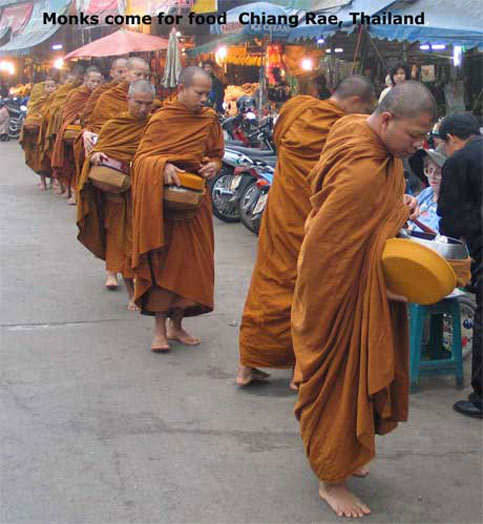
|
Breakfast ritual for monks in Thailand
|
See Nancy in blue shirt, just to the right and behind the first monk?
Toward the end, two young novices came and Nancy gave them food. They took it, turned and left, but our guide called them back and rebuked them, kindly but sternly: "Have you not
learned you are to be grateful and thankful when you receive gifts? Have your masters not taught you to bless strangers for their kindness?" Then he squatted down near the curb and instructed them
as to proper respect they should have given us. His words were received by them as those coming from a teacher, and they bowed to him in appreciation.
|
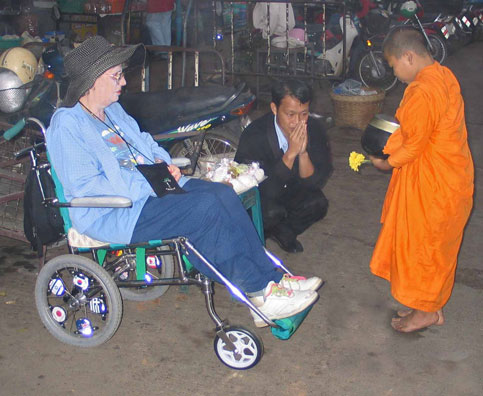
|
Our guide instructs a "newbie" in the proper form for bowing in appreciation.
|
PLEASE NOTE STREET WHEELS ALL AROUND ON WHEELCHAIR.
Normally I would have changed the configuration to street wheels on rear, large tires on front, but getting up at 4 in the morning clouds my thinking. Also note "ice
breaker" decals on rear wheels.
After the monks left, so did we, and our guide took us next to a seldom visited area where the Hill Tribe people were making a rice liquor. It is bottled then sold in the town markets.
|
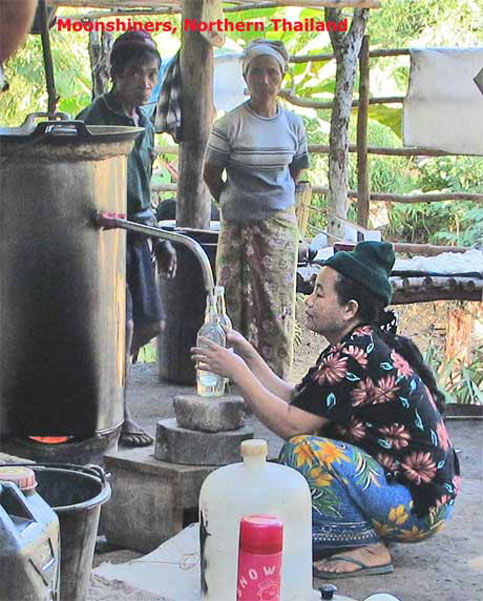
|
Much more of this than Pepsi or Coke is consumed in Northern Thailand.
|
This is perfectly legal in Thailand, but it felt like "revenooers" could burst in at any moment.
The Hill Tribe area is vast, and although it is an important tourist attraction, great portions of this area are ignored by most tour groups. In fact, there were no other tourists around
as we stood and watched their ancient methods used to produce this valuable product. Profits are distributed throughout the community and are used to buy materials benefiting the entire "extended
family." We left the "pseudo-moonshiners"
and went next to a "factory" where they produce sesame oil and a myriad of other sesame-containing products. The people ar this "factory" had seen Caucasians in town, but never their
area. And we were the first visitors in a wheelchair of any race or color.
Check this out. You won't believe your own eyes: |
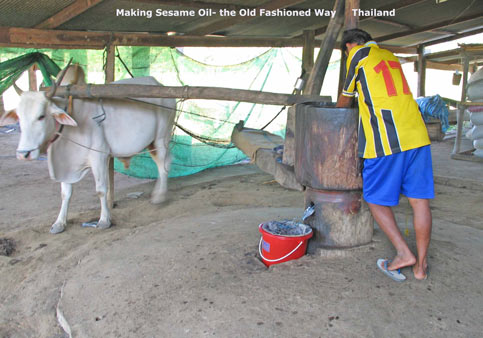
|
Great care is taken of the animals.
|
Oxen are rotated every two hours and never beaten or mistreated.
How many tourists get to see authenticity of this magnitude? The ox is tied into a harness. The harness is linked to a large wooden grinding pestle placed within the ancient copper vat.
As the ox goes round and round, the pestle rotates inside the vat, grinding the sesame seeds the worker pours in at the top. Look closely. You can see the oil coming out at the bottom into the red plastic
bucket at his feet! Cleanliness is maintained, but varies according to the sensitivities of the viewer. Most Americans would find the operation a bit less than clean.
Yes, you could have arranged for a group tour at the hotel tour desk and seen interesting sights for about $25. The private guide was not that much more money, and look what we saw!
It's no wonder my patients look through our photo albums then turn to me and say, "I was where you were, but I didn't see that..." Hopefully, with all these examples, you'll understand why we
have emphasized the importance of using a private tour guide if at all possible. Of all places to economize on a trip, this is not the one. you simply limit yourself too severely trying to "do
it yourself" with a guide book in one hand, a map in the other. If you can afford only one day on your trip, pick the highest highlight of your planned journey and hire a private guide for that one
spot. Believe us- when you return from your trip, the memories of that one experience will be the highlight of the entire adventure. Even if you cannot afford one day, don't despair!
There is yet one more great tip in our travel bag:
Go to an area where there are lots of cabs, such as in front of a large hotel. Go up to the first driver and, if he speaks passable English, tell him you are thinking of hiring him
for the day. Pay attention, please, to the words we are writing. Ask what will he charge you to take you around the area and point out important things of interest? Whatever he tells you, make a note
of how well you understand him, the price he quoted you, and his attitude. BUT DO NOT HIRE HIM, at least not yet. Go to the next cab in line and repeat the same questions, noting again how well you
understand him, his attitude, and how much he will charge. Do this a few times until you get a "feeling" about one driver over the others. If you engage them in conversation for a few minutes,
it will give you much greater insight about what it will be like to spend an entire day with each of them.
Don't let the cost be the only determining factor, however. The cheapest guy may be the biggest dud, and will be no bargain at all. We know it may sound complicated, even impossible
to you now, but you'll get the hang of it very quickly. After trying several drivers, you should be able to select one who impresses you as being someone you would like to take you around. Agree on a price
(use the bargaining techniques we teach in the chapter on bargaining), and then write on a piece of paper: "I (have driver fill in his name) agree to drive (fill in your name) around the area
of (fill this in as appropriate) for (fill in amount of time) at a total cost of (fill in the agreed amount- in US dollars or local currency if you the exchange rate). Have him
sign and date the paper. DO NOT LOSE IT! If he will not sign the paper, skip over him, even if he is head and shoulders better than all the rest. Trust us- anyone who refuses to sign is surely
going to be trouble before the day is through, and you will regret your decision every time you think back on this trip! Ignore our advice at your own peril.
You will not believe how many rimes there is a dispute between you and a cab driver about money. What recourse do you have? Not much. Perhaps you can call over a policeman or some official
to help you. You should know, however, when the local police come over to settle the dispute (in a language you do not understand), the amount the driver tells the cop you agreed to pay in the morning
may be vastly different than what he is trying to charge you at the end of the day. Sadly, we have also seen situations where the driver splits money with the local cop after the dispute is settled. If
you have that signed piece of paper, you will not be fleeced. We do not mean to be alarmist, and using cabdrivers is a very good tip- but you must be careful, as not everyone in foreign countries is your
friend. |
|
|
